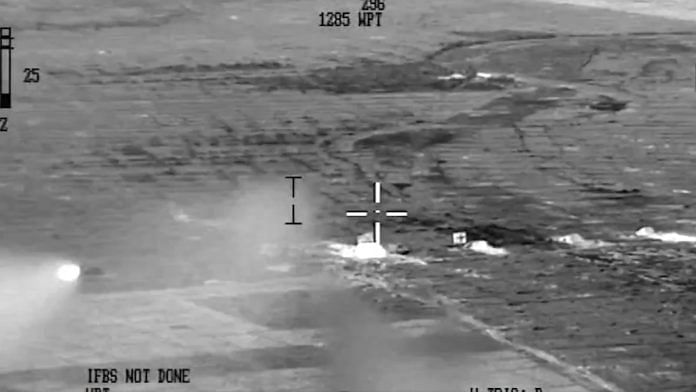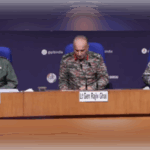According to data available on the South Asia Terrorism Portal (SATP) data showed that since 2000, the TRF has killed 48 civilians and eight security personnel in the Kashmir valley. From 2022, five separate terror attacks by the Jaish front, People’s Anti-Fascist Front, killed 10 security personnel in J&K, the SATP data showed.
Of 60 active foreign terrorists in Kashmir, 35 are Lashkar and 21 are Jaish terrorists, J&K police data till February 2025 showed. The in J&K since 2019 include 270 Lashkar-e-Taiba terrorists, ThePrint has reported earlier.
“Pakistan wanted to wash its hands of terrorism. That is why this was all very strategically planned. Lashkar and Jaish terrorists received military training as well as funds from Pakistan’s ISI (Inter-Services Intelligence). The foreign terrorist group [TRF] behind the Pahalgam attack is behind the last two years’ terror attacks. Locals, who went to Pakistan, received military training in the terror camps too,” said a source.
The year 2019, after the revocation of Article 370, saw the beginning of TRF, which, sources in the security establishment say, is a virtual Lashkar front created to continue terrorism in Kashmir by trying to portray the outfit as a rebel group. The People’s Anti-Fascist Front, they say, is a Jaish front. These offshoots surface on social media with different handles.
“Their creation was to portray that J&K terror modules are indigenous, and that is also why they did not give the outfits religious names. These virtual fronts are running on Pakistani soil, remaining involved in all terror attacks of the last five-six years,” another source said.
As Indian security agencies claimed that it hit nine of the 21 terror camps spread across Pakistan and Pakistan-occupied Kashmir, ThePrint takes a look at the key leaders of the outfits and their role in major attacks that have rocked India in the past.
According to an intelligence dossier that ThePrint has obtained, terrorist Maulana Masood Azhar remains the Jaish ‘De Jure chief (head)’. Jaish-e-Muhammed was launched in 2000, a year after India released Masood Azhar from jail, where he ended up after the IC814 hijack. Jaish branched out from the main Harakat-ul-Jihad-i-Islami, which also had the Harakat-ul-Mujahideen branch that carried out the hijacking.
and carried out terror activities from its headquarters in Markaz Subhan Allah in the outskirts of Karachi Mor’s Bahawalpur—one of India’s targets Wednesday. Bahawalpur is a hub for training and terror indoctrination.
JeM has shared close ties with the former Taliban regime in Afghanistan and Osama bin Laden’s Al-Qaeda. This terrorist organisation also has links with Sunni terrorist outfits operating in Pakistan—Sipah-e-Sahaba Pakistan, Lashkar-e-Jhangvi, etc.
The Markaz Subhan Allah, operational since 2015, was the centre for training terrorists for the 2019 Pulwama attack. It houses the residences of Azhar; de facto chief Mufti Abdul Rauf Asghar, the brother of Azhar Masood; Maulana Ammar; and others. Markaz Subhan Allah sees regular arms training and indoctrination sessions. The training of the Jaish cadre also includes six days of archery training, as well as horses and a riding ground, built in May 2022.
Masood Azhar, the Jaish chief, was under the protective custody of Pakistan authorities in an undisclosed location in Islamabad or Rawalpindi, according to Indian intelligence. The Jaish operations are managed in the Markaz Subhan Allah by Mufti Abdul Rauf Asghar, also commander-in-chief (operations), by managing the weapons consignments. Asghar, of late, acquired M4 rifles left behind by the NATO forces in Afghanistan through Khyber Pakhtunkhwa-based smugglers, Indian intelligence claims.
The Jaish spokesperson is Mohammad Hasan, and Maulana Qari Masood Ahmed is the chief of their propaganda wing. Maulana Sajjad Usman manages finances, and Ibrahim Rather is the chief of military affairs. Yusuf Azhar, the brother-in-law of Masood Azhar, is the Jaish armed wing head. Maulana Mufti Mohammad Asghar alias Saad Baba is another key figure who operates as a launch commander.
Other key Fidayeen terrorists include Masood Azhar’s nephews, Talha Rasheed Usman, Umar, and Mohammed Ismail alias Lambu—all sent to Balakot for arms training. India had launched the Balakot attack to avenge the Pulwama killings.
On 30 November last year, Masood Azhar addressed the Fidayeens at the Markaz Subhan Allah after nearly two years. Taking an anti-India stance, he sought revenge for the Babri Masjid demolition. His younger brother, Talha Saif, and his son, Abdullah Bin Masood, also attended his address.
Another key Jaish commander is Ashiq Baba from J&K’s Reasi. India arrested him for involvement in the 2016 Nagrota Army base attack.
Last year, Masood Azhar also visited the Markaz Subhan Allah and met with Jaish’s Mufti Asghar Khan Kashmiri and Abdullah Jihadi. Kashmiri, a close aide of Mufti Abdul Rauf Asghar, is a key Jaish commander.
In Pakistan-occupied Kashmir, another key centre for Jaish is the Syedna Bilal Masjid. The transit camp is on the first floor. It consists of a Hijama centre and a training centre provided by the Pakistan Special Operations Group (SOG) and the military. Kashmiri runs this centre. Moreover, Indian fugitive Ashiq Ahmed Nengroo, named as an accused in the 2019 attack on the CRPF convoy in Pulwama, operates from the area. Nengroo was also involved in the 7 December 2023 arms dropping incident. A drone dropped one AK-47, two AK magazines and five grenades in Sopore.
Apart from the 2019 Pulwama attack, Jaish was also behind the 2001 Parliament attack that killed eight security personnel. In 2000, Jaish carried out a suicide bombing near an Army barracks. In 2001, another Jaish attack near the J&K legislative assembly killed 38 people. Between 2014-2015, Jaish did several terror attacks in Kashmir which killed several security personnel in Kashmir. Jaish is also behind the 2016 Uri attack.
Its front, PAFF, has, of late, been involved in terror attacks in Kathua, Samba, Udhampur, and Doda-Kishtwar.
The mastermind of the 2008 Delhi terror attacks—Hafiz Muhammad Saeed—runs the operations of Lashkar. Talha Saeed, his son, is currently taking control of the Lashkar’s operations, trying to step into his father’s shoes.
Key operatives of Lashkar include Sajid Mir, who played a major role in planning the 26/11 Mumbai attacks in 2008. He is wanted by the United States Federal Bureau of Investigation. Lashkar’s operational commander is Zaki-ur-Rehman Lakhvi, also one of the brains behind the Mumbai attack. He looks after the functioning of the training camps and planning of the major terror attacks.
Yahya Mujahid handles propaganda, and Haji Muhammad Ashraf finances. Another senior commander, Arif Qasmani, handles the dealings with Al Qaeda. Lashkar co-founder Zafar Iqbal looks after the ideological training of the Fidayeen youth. Mohammed Yahya Mujahid is the chief of the media department. He is responsible for managing the organisation’s propaganda strategies and public relations.
Lashkar offshoot TRF is managed by Sajid Gul alias Saifullah Khalid, who hails from Srinagar and allegedly went to Pakistan for training. Saifullah Sajid Jutt, a Pakistani national who married an Indian-origin woman, is a top TRF commander.
On 12 October 2019, the TRF claimed responsibility for a grenade attack in Srinagar’s Hari Singh High Street, injuring eight civilians. TRF made headlines in May 2020 after killing five of the Army’s (Paras) Special Forces unit in an encounter at Dongri Behak near the Line of Control at Keran, Kupwara. TRF was involved in more attacks on security forces in Sopore, Baramulla and Kupwara, leading to the deaths of 11 security forces personnel.
TRF has over time targeted and killed several civilians including a jeweller, Satpal Nischal, in his shop at Sariaballa in Srinagar after he received the domicile certificate of J&K. It has also been involved in the killing of Kashmiri M.L. Bindroo and Makhan Lal Pandita. In October 2021, TRF terrorists barged into a school and killed the principal, Supinder Kaur, a Kashmiri Sikh woman, and a teacher, Deepak Chand of the Kashmiri Pandit community.
TRF also claimed responsibility for the Ganderbal terror attack in October 2024. The attack at a tunnel construction site in Ganderbal killed seven, including one doctor and six migrant workers. The group has also claimed responsibility for the Reasi bus attack carrying 50 Hindu pilgrims. The attack left nine dead.
The Lashkar offshoot is responsible for terror attacks on security personnel in Poonch, Reasi, Rajouri, and Doda-Kishtwar, as well.
(Edited by Madhurita Goswami)








